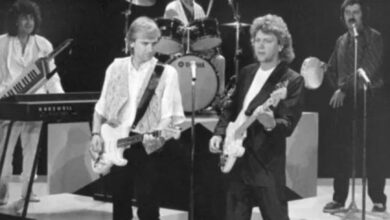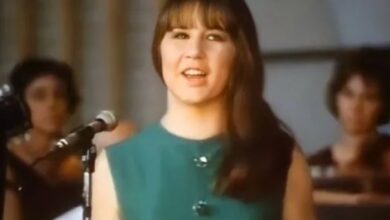Lukas Nelson Channels His Father’s Spirit in a Stirring Rendition of ‘Always on My Mind’—A New Generation Revives a Classic
When Lukas Nelson performed “Always on My Mind,” he wasn’t just covering one of his father’s greatest hits—he was stepping into a legacy steeped in emotion, artistry, and cultural impact. Originally made famous by Willie Nelson in 1982, the song became one of the most recognizable ballads in American music history. But hearing Lukas sing it now, with that familiar vocal tone and haunting phrasing, gives the classic a fresh resonance. In a world far removed from the early ’80s, the song’s themes of regret, love, and longing feel just as piercing—perhaps even more so when delivered by the son of the man who made it an anthem.
Lukas Nelson was born into music. The son of country music legend Willie Nelson and frequent frontman of his own band, Promise of the Real, Lukas carved a name for himself well before audiences began comparing his voice to his father’s. With roots in folk, rock, and Americana, he has collaborated with artists like Neil Young and Bradley Cooper, even contributing to the A Star Is Born soundtrack. But despite his modern appeal, Lukas carries within him a timeless quality—a vocal ache that echoes the same gentle sorrow Willie poured into his most famous ballads.
“Always on My Mind” wasn’t originally written for Willie. Composed by Wayne Carson, Johnny Christopher, and Mark James, the song was first recorded by Brenda Lee in 1972 and famously covered by Elvis Presley the same year. But it was Willie Nelson’s version in 1982 that brought it into the heart of American culture. His rendition topped the Billboard Hot Country Singles chart and won three Grammys, including Song of the Year. The ballad, with its slow-burn melody and confessional lyrics, became the definitive Willie moment—and arguably one of the most vulnerable songs ever sung by a male country artist.
When Lukas Nelson took to the microphone to perform this beloved classic, he didn’t try to outshine or reinvent it. Instead, he honored the original arrangement: gentle piano, soft acoustic strums, and the same contemplative tempo. His voice, though distinctly his own, carries that unmistakable Nelson inflection—rich, wistful, and emotionally raw. The performance doesn’t rely on production tricks or vocal theatrics; it leans on sincerity, which is exactly what made the original so enduring.
The reception to Lukas’s version was immediate and heartfelt. Shared widely online, particularly among country music fans and older generations nostalgic for the original, his performance struck a chord. Listeners flooded comment sections with comparisons to his father—not as a critique, but as admiration. Some even remarked that closing their eyes made them feel like they were back in 1982. In a digital world saturated with polished performances, this raw, intimate rendition felt like a rare return to truth.
The cultural significance of Lukas singing “Always on My Mind” extends beyond simple tribute. It represents a passing of the torch—not just from father to son, but from one era of country music to the next. The Nelson name remains synonymous with heartfelt storytelling, and this performance solidified Lukas as more than just an heir to a musical dynasty. He became a steward of emotional authenticity, capable of translating timeless songs to a new generation without losing their original spirit.
The performance also marks a milestone in Lukas’s journey. While his original work with Promise of the Real has earned critical praise, there’s a different kind of vulnerability in performing a song so intimately tied to his father. Rather than stepping out of Willie’s shadow, Lukas chooses to stand beside it, paying homage while remaining fully himself. This blending of old and new could very well open doors to further explorations of classic country from contemporary voices.
As for influence, performances like Lukas’s help keep traditional country music relevant. In an age where the genre often skews toward pop production and party anthems, songs like “Always on My Mind” remind audiences of country’s roots—narrative honesty, emotional clarity, and understated musicianship. It sets an example for younger artists and proves that there’s still an appetite for songs that speak from the heart rather than just for the charts.
Several artists have interpreted “Always on My Mind” over the years, from Elvis to the Pet Shop Boys—whose synth-pop version brought it to a different audience altogether. But none carry the personal weight that Lukas’s performance does. It’s not just about musical technique; it’s about lineage, memory, and emotional truth. And that makes his version uniquely powerful.
The timing of Lukas’s performance also adds weight. In recent years, Willie Nelson has continued to record and tour despite health concerns and the natural aging of one of America’s last great troubadours. For longtime fans, Lukas’s rendition feels like a living tribute, a gentle reassurance that the music—and the emotion behind it—will endure even as generations shift.
“Always on My Mind” remains one of the most frequently played songs in country radio history and is firmly embedded in pop culture. It’s appeared in films, commercials, and even political events. That a new version could still resonate so deeply speaks to the song’s staying power—and to Lukas’s ability to tap into that well of emotion.
In terms of legacy, the performance connects two distinct eras in American music. It doesn’t simply recycle nostalgia—it breathes new life into it. Lukas’s voice is not a replica, but a reflection. And through that reflection, listeners find comfort, familiarity, and a renewed sense of the song’s universal message.
Willie Nelson’s impact on music is vast and enduring, and while no one can replace his presence, Lukas’s voice serves as a reminder that the legacy of heartfelt, sincere country music is in capable hands. His rendition of “Always on My Mind” isn’t about filling shoes—it’s about continuing the walk down a path laid in melody, memory, and love.
As long as voices like Lukas Nelson’s carry songs like this forward, the heart of country music will keep beating strong. In honoring his father, he’s given us a reason to believe that the most beautiful songs never really end—they just find new voices to keep them alive.





